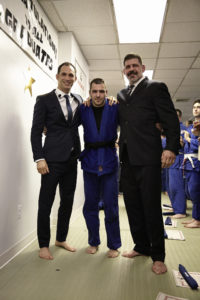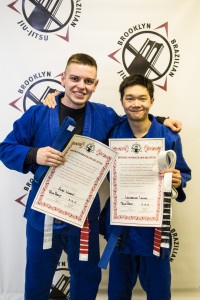No truly healthy person I know just stumbled into a life of proper nutrition and emotional balance.
Sure, they may have come across the martial arts by accident…or they may have found a diet that worked for them by chance. But none of their long-term results happened passively. They’ve all been the product of consistent effort over time.
That effort over time is what people call “habit”. And they come in good flavors…and bad.
 If we want to lead a healthy lifestyle, we have to develop healthy habits. And just as with Martial Arts training, there are no shortcuts.
If we want to lead a healthy lifestyle, we have to develop healthy habits. And just as with Martial Arts training, there are no shortcuts.
So how can you develop a successful lifestyle – in the martial arts and beyond?
- Put a premium on your physical fitness. It’s got a few components, starting with what you eat and how you rest. You can never out-train bad nutrition, poor rest/recovery habits or poor energy planning. You can be the most talented practitioner in the world, but if you neglect your physical health off the mat, you’ll soon pay for it.
- Work on your emotional fitness. Your attitude, temper and emotional balance need attention also.Are you working on improving your emotional state management? In training, you can discipline yourself to approach each partner, each drill, each technique with an open mind. Not letting small things set you off part of working on emotional balance. And you can integrate this practice in your daily life – in your family, at the workplace, during your commute – by reflecting on the classroom lessons.
- Don’t neglect your mental fitness. This is all about your focus and attention. Your mind is always with you, so if you don’t do something to strengthen your willpower, your ability to pay attention or how you talk to yourself, you’ll never feel completely healthy. How are you training yourself to listen better? Being mentally fit means that you’re becoming a better communicator. It also means creating the self-discipline to make hard choices you know are good for you. Mental toughness, perseverance, non-quitting spirit…these are all part of your mental fitness.
In the martial arts, we start working with all of these on the mat. It’s the most immediate and up-front way to examine where we’re weakest.
Because the practice is a concrete habit, it’s also ideal to strengthen these “habit” muscles. We can next start to work on these areas when we’re off the mat.
Nothing too complicated: increase your water intake, or start eating more fresh fruits and vegetables. Maybe it’s time to eliminate fried foods, junk foods or sugar.
Health is about proportion, harmony, stability. Martial arts brings balance…and so should your habits.
If you’ve been neglecting one or more of these areas, start right now. By developing good health habits, you don’t only take steps toward black belt-level martial arts. You think clearer, have more energy and perform better than ever before.
You’ll be a better parent, spouse, friend and martial artist on purpose, for the long-term.
And who doesn’t want that?







 The good news for us is martial arts are designed for that slow process of incremental growth. We crawl in the beginning, and then when we can stand on our two feet confidently, we’re invited to reach a little beyond where we are. Maybe not to run, but certainly a brisk walk or a trot. It may mean working with more experienced partners, or it may mean more progressive techniques. It could be moving to a more advanced program of training.
The good news for us is martial arts are designed for that slow process of incremental growth. We crawl in the beginning, and then when we can stand on our two feet confidently, we’re invited to reach a little beyond where we are. Maybe not to run, but certainly a brisk walk or a trot. It may mean working with more experienced partners, or it may mean more progressive techniques. It could be moving to a more advanced program of training.